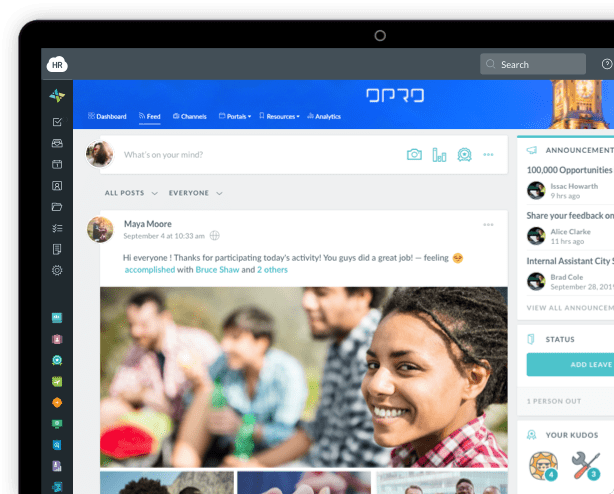It’s ridiculously easy to copy a job description from another business, so if you’re reading this article, it means that you’ve chosen a better way: writing it yourself.
Using a copied or slightly revised job description automatically means average quality candidates because it’s not tailored to the real needs of your business. On the other hand, creating a custom, engaging and effective job description that describes a perfect candidate for your business will attract better talent. Why? Because hiring the best talent begins with attracting the right talent.
Obviously, a great job description here is key, so with a bit of effort, you can create a job description that combines the reality of the position, markets your business, and outlines the necessary skills, and describes the organizational culture.
Let’s learn how to write such job description in this article.
Step #1: Get Job Title Right
Let’s get straight to the business: a great job title has these qualities:
-
Does not have the “ninja” or “rock star” words in it (these are simply no longer cool because everyone is a superhero and a rock star these days)
-
Doesn’t exaggerate the importance of the position
-
Represents the main keywords used by candidates to look for this job online
-
Is free of age and gender implications
-
Accurately reflects the nature of the position
Step #2: Sell Your Company
This means showcasing your company in the best light possible. To do that, you should clearly but briefly outline what it does and why someone would work there. This is a perfect opportunity to show how your company stands out from others, so use it properly.
For example, you should describe the following:
-
Your vision and mission
-
Company’s core values
-
How many people work for your company
-
What the organizational culture is like
-
Any recent impressive achievements
Step #3: Include a List of Duties and Responsibilities
“This element will vary in length but should be as short as possible,” recommends Susan Morrison, an HR expert at Get Good Grade. “Because it will be the largest part of the description that will make it sound like an operational manual.”
Identify real (only real!) daily responsibilities of the employee and add them with a percentage showing how much time is expected to be dedicated to each task.
Here are some good examples:
-
Creation of online marketing-related written content (60 percent)
-
Proofreading of content produced by others (20 percent)
-
Approving, posting, and managing content on the company’s website (20 percent)
Notice how specific these examples are. Try your best to do the same with your responsibilities as well.
Step #4: Describe Skills and Experience
List them separately from each other to let candidates know what skills and experience are required and what gives an advantage over others.
For example:
Required skills and experience:
-
A candidate must have a marketing certificate to be considered for the job
-
Must be able to meet deadlines
Skills and experience that give an advantage:
-
An ideal candidate has 5+ years of experience in social media marketing
-
A+ candidate will have expert Photoshop skills
In case you need to localize the job description, use translation services.
Step #5: Decide on a Compensation Range
If you cannot come up with a fair salary and need some help, you can use free services such as PayScale and Salary.com to compare estimates.
Or you can just Google the following:
Position + Salary Range + Location
Step #6: Set a Hiring Deadline
“By setting a hiring timeframe, you’re ensuring that you’ll be moving through the hiring process at your pace plus you’re creating a bit of urgency,” explains Victor Cousins, the head of talent acquisition at Supreme Dissertations. “If the candidates feel the sense of urgency, they will be much more compelled to send their resume.”
So, include specific start dates or deadlines for resume submission.
Step #7: End with a Call to Action
A job description is incomplete if it doesn’t encourage the readers to apply. So, include an appropriate call to action (add specific instructions for how to apply as well) as the final sentence of the description and push the candidates to get in touch with you as soon as possible.
Bonus Tip: Use Tools
There is a wide variety of helpful tools to craft a compelling job description out there, so we compiled a list with some of the good ones:
-
Hemingway Editor. Analyze your job description for clarity, word selection, and get a readability score.
-
Hot Essay Service. Have your job description checked by a human proofreader and get tips for improvement.
-
Grammarly. A well-known text checker that offers special proofreading options for job-related documents, such as resumes, job descriptions, business letters etc.
-
Flash Essay. A tool that can be used to detect any errors and unclear details in the job description and get help with outlining and calls to actions.
-
Rated by Students. Job description templates for specific positions as well as writing help.
-
Rewarded Essays. Writing, coaching and advice on creating business-related texts.
Over to You
An effective job description is custom written and pulls in the attention of everyone who decides to read it. To attract the best talent, keep these tips in mind the next time your company needs to post a new job.
About Author: This article is written by a marketing team member at HR Cloud. HR Cloud is a leading provider of proven HR solutions, including recruiting, onboarding, employee communications & engagement, and rewards & recognition. Our user-friendly software increases employee productivity, delivers time and cost savings, and minimizes compliance risk.

Keep Reading
Retention Reset: How to Keep Your Best Talent in 2025
More employees are walking away from their jobs in 2025 not just for better pay, but for
The Most Common Hiring Mistakes in the Healthcare Industry
The hiring process can be tedious in the healthcare industry, and it may be tempting to


